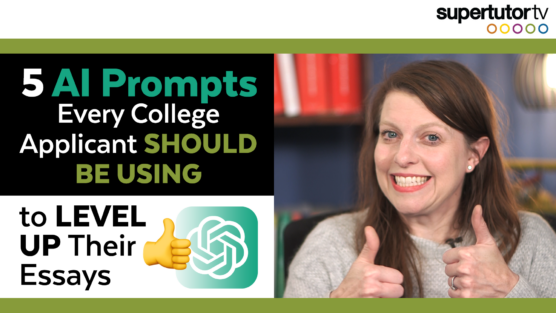Are you trying to get into a competitive college and wondering if you have any hope, even if you’re an underdog candidate? Over the course of the last almost 20 years that I’ve been working with students trying to get into elite colleges, I have noticed a pattern among the few kids that, to be honest, I didn’t think they would get in, and they did. So, I’m going to share with you three characteristics of my underdog students that I think really helped them stand out.
Making Connections
The first attribute of my underdog students is making connections. Some of my students—and sometimes their parents—have an incredible capacity for trying to get connected. And some of you are probably sitting there thinking that you don’t know the Dean of Admissions at Harvard, so how are you going to get in? And it’s true; if you know the Dean of Admissions at Harvard, it does make it a little bit easier for you to be one of these underdog candidates. But there are other ways that I have seen students who weren’t necessarily automatically connected make connections, and I’m going to go through some of those.
One is reaching out to faculty at the school in a context that makes sense. Sometimes that’s a student who goes to a summer program and forges a relationship with a professor there. Sometimes it’s reaching out to a teacher at the school, even though you haven’t gone there yet. I had a student once who, every time he visited a school, would write to everybody that was in the department he was interested in and ask them if he could bring them a Starbucks during office hours and talk to them about the department. And he did that at every school, and I will say, it didn’t work at a lot of the schools, but it worked at one. And that’s where he went. That faculty member actually wrote him a letter of recommendation, which is almost unheard of. He’s super charismatic—the kind of person who shines beyond their class rank and their test scores because they have a natural kind of charisma.
Another thing that students have done is to reach out to their contacts. Do you know anybody who went to this school? Do they know anybody who’s an admissions interviewer in their area who can introduce them to the head of the admissions interviews in that area and ask them more about the school? And I think sometimes this comes down to actually getting a nudge, an email, or something sent to the actual institution, but sometimes it’s actually just familiarization, meaning that students build out their contacts. They even talk to other students who have attended the school. They try to connect themselves as closely as possible to that campus, and that understanding can sometimes filter down into their application itself as well.
The other thing is getting letters of recommendation from alumni whenever possible. Another thing I’ve had some students do is switch out who does their letter of recommendation from their high school according to where their teachers went to college. So if they have a teacher who went to Yale and they’re applying to Yale, sometimes they will rework their strategy on letters and ask the Yale teacher to write the Yale recommendation. And I have seen that that can also be an effective strategy. And likewise, if you’re an athlete who maybe isn’t recruitable but you’re still good, can you reach out to those coaches? Maybe you can have those coaches send a little letter over to say that this kid’s probably good enough to be on our team.
Making connections is a great skill. And it can sometimes be a thumb on the scale beyond just your metrics, what you’ve accomplished, and what you’ve done.
Persistence
Trait number two is persistence. Now I don’t know if my underdog students get in because they’re persistent, so they just never give up, and that exudes through their application, and that quality is more important than grades or test scores for success in life, or if their persistence actually leads to direct actions, but either way, my underdog students usually don’t get in the first round. They get in after being deferred, or they get off wait lists. They claw their way into these universities, and one tool in that mix is always a LOCI (letter of continued interest). Sometimes they write two at different stages; after they’re deferred, they write a LOCI, and after they’re waitlisted, they write another LOCI.
They are also sending updates. If they have any new awards or any new reasons to brag, they send over an email to admissions. Sometimes they keep taking the SAT or the ACT. If their score is not there in October, they take it again in November, they take it again in December, and they don’t give up. Oftentimes, my underdog students have taken the ACT or the SAT more times than most of my other students. I have three underdog students I’m thinking of right now, and all three of them took standardized tests at least five times, but this is why they’re underdog students. They may have had a 33 on the ACT, but that 33 was hard-fought; it was not like they blinked and got a 35 out the door. I had one student who got a 35, but it wasn’t a 35 all along. It was 31, 32, 33, 34, then 35. So, again, I don’t know that persistence is the reason that they got in, but these kids are persistent, and if you are persistent, that’s going to bode well for you in this process. And sometimes they also write narratives about how they don’t give up. It is a marked character trait that I have seen in these students that they are the underdogs that do manage to get in; they’ve got grit, and they’ve got persistence.
Acknowledge Their Faults
Number three: they acknowledge their faults. This is often my LOCI strategy, and I know I talk about it in my other videos, but students who are underdogs that get in usually acknowledge their faults. And the reason that they become underdogs is usually that something is not perfect in their application. Now I will say that if you have C’s, it is probably over for Harvard, Stanford, Princeton, and Yale. There’s a 99.9% chance it’s not happening because there’s just too much grade inflation in the United States to deal with your C’s. So please don’t think that you’re going to talk your way out of that, but maybe you could explain if you’ve got five B’s, six B’s, and then you have an upward trend in your grades. Maybe you could explain why you didn’t do a lot of activities your freshman year. You explain it, you talk about it, you figure it out, and then we understand what happened. You admit that you’re not perfect, but you also reiterate why and how you’re awesome. So the other thing that these students know how to do is acknowledge what they’re missing so that they can use the power of persuasion to argue it away. Again, they landed in my underdog pile because of the facts, and if those facts aren’t shiny and bright, these students know how to acknowledge and call out the weakness before somebody else calls it out on them. Of course, the balance should always be positive, and it should always emphasize how awesome you are, but being real can also pay off.
I hope you guys enjoyed this blog and that it was helpful!


